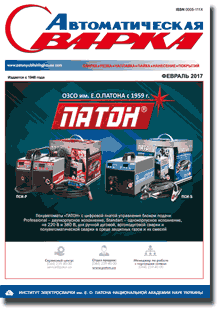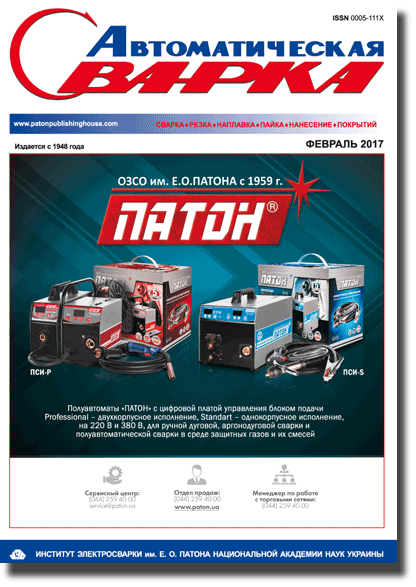| 2017 №02 (05) |
DOI of Article 10.15407/as2017.02.06 |
2017 №02 (07) |

Avtomaticheskaya Svarka (Automatic Welding), #2, 2017, pp. 31-35
Formation of diffusion zone in welded joints of porous aluminium alloy with monolithic magnesium alloy at chemical activation by gallium
Yu.V. Falchenko, M.A. Khokhlov, Yu.A. Khokhlova And V.S. Sinyuk
E.O. Paton Electric Welding Institute, NASU 11 Kazimir Malevich Str., 03680, Kiev, Ukraine. E-mail: office@paton.kiev.ua
Abstract
Comprehensive investigation of mechanical and physical properties of diffusion zone of the produced joints was performed as part of fulfillment of the technological task, namely producing superlight welded structures from porous aluminium alloys of Al–Mg–Zn system and monolithic magnesium alloys (ML4 standard alloy of Mg–Al–Zn system and experimental alloys of Mg–Ga system). The objective of the study was evaluation of the influence of heating cycle, characteristic for different welding processes, on the joints. Welding was performed by two methods with maximum heating temperature up to 300 °C: diffusion welding with long-term cycle of heating in vacuum, and welding with heating by passing current in air, which is characterized by short heating cycle. Gallium was used for forming a monolithic joint and diffusion activation. It is found that a diffusion zone about 10 mm wide forms on porous aluminium side, with slight lowering of micromechanical properties in pore walls, that is typical for aluminium alloys at contact with gallium. In magnesium alloys, an extended (60–100 mm) wavy intermetallic-strengthened diffusion zone forms along the joint line in both the welding processes, mostly of Mg5Ga2 composition with melting temperature of 456 °C that is higher than the welding temperature. Thus, the possibility of joining porous alloys to monolithic ones is shown at their slight heating and chemical activation of the joint zone by gallium. 11 Ref., 1 Table, 8 Figures.
Keywords: magnesium, porous aluminium, gallium, diffusion welding, welding with heating by passing current
Received: 21.12.16
Published: 16.03.17
References
- (2002) Handbook of cellular metals: Production, processing, applications. Ed. by H.-P. Degischer , B. Kriszt. Wiley-VCH Verlag GmbH & Co.
- Khokhlov, M.A., Ishchenko, D.A. (2015) Structural superlight porous metals (Review). The Paton Welding J., 3/4, 57–62. https://doi.org/10.15407/tpwj2015.04.08
- Paton, B.E., Ishchenko, A.Ya., Ustinov, A.I. (2008) Application of nanotechnology of permanent joining of advanced light-weight metallic materials for aerospace engineering. Ibid., 12, 2–8.
- Kharchenko, G.K., Falchenko, Yu.V., Fedorchuk, V.E. et al. (2012) Manufacture of stainless steel-aluminum transition pieces by vacuum pressure welding method. Ibid., 1, 26–28.
- Khokhlov, M.A., Khokhlova, Yu.A. Method of joining of bimetal bloc for thermal insulation of microelectronics elements. Pat. 69145 UA, Int. Cl. B01B 1/00, B23K 1/00. Fill. 05.09.2011. Publ. 25.04.2012.
- Khokhlova, J. (2013) Intergranular phase formation during reactive diffusion of gallium with Al alloy. Materials Sci. Forum, Vol. 768–769, 321–326. https://doi.org/10.4028/www.scientific.net/MSF.768-769.321
- Khokhlova, J., Khokhlov, M., Synyuk, V. (2016) Magnesium alloy AZ63A reinforcement by alloying with gallium and using high-disperse ZrO2 J. of Magnesium and Alloy, 4(Dec.), 265–269. https://doi.org/10.1016/j.jma.2016.10.001
- Khokhlov, M., Ishchenko, D., Khokhlova, J. (2016) Peculiarities of forming diffusion bimetallic joints of aluminum foam with a monolithic magnesium alloy. Ibid., 4(), 326–329. https://doi.org/10.1016/j.jma.2016.11.001
- Kazuhisa Miyoshi. Surface characterization techniques: An overview, 12–22. https://ntrs.nasa.gov/achive/nasa/casi.ntrs.nasa.gov/20020070606.pdf
- Oliver, W.C., Pharr G.M. (1992) An improved technique for determining the hardness and elastic modulus using load displacement sensing indentation experiments. of Materials Research, 7, 1564–1583. https://doi.org/10.1557/JMR.1992.1564
- Nano indenters from micro star technologies. Revision 2.3 P.9. http://www.microstartech.com/index/nanoindenters.pdf
The cost of subscription/purchase order journals or individual articles
| Journal/Currency | Annual Set | 1 issue printed |
1 issue |
one article |
| TPWJ/USD | 384 $ | 32 $ | 26 $ | 13 $ |
| TPWJ/EUR | 348 € | 29 € | 24 € | 12 € |
| TPWJ/UAH | 7200 UAH | 600 UAH | 600 UAH | 280 UAH |
| AS/UAH | 1800 UAH | 300 UAH | 300 UAH | 150 UAH |
| AS/USD | 192 $ | 32 $ | 26 $ | 13 $ |
| AS/EUR | 180 € | 30 € | 25 € | 12 € |
| SEM/UAH | 1200 UAH | 300 UAH | 300 UAH | 150 UAH |
| SEM/USD | 128 $ | 32 $ | 26 $ | 13 $ |
| SEM/EUR | 120 € | 30 € | 25 € | 12 € |
| TDNK/UAH | 1200 UAH | 300 UAH | 300 UAH | 150 UAH |
| TDNK/USD | 128 $ | 32 $ | 26 $ | 13 $ |
| TDNK/EUR | 120 € | 30 € | 25 € | 15 € |
AS = «Automatic Welding» - 6 issues per year;
TPWJ = «PATON WELDING JOURNAL» - 12 issues per year;
SEM = «Electrometallurgy Today» - 4 issues per year;
TDNK = «Technical Diagnostics and Non-Destructive Testing» - 4 issues per year.





